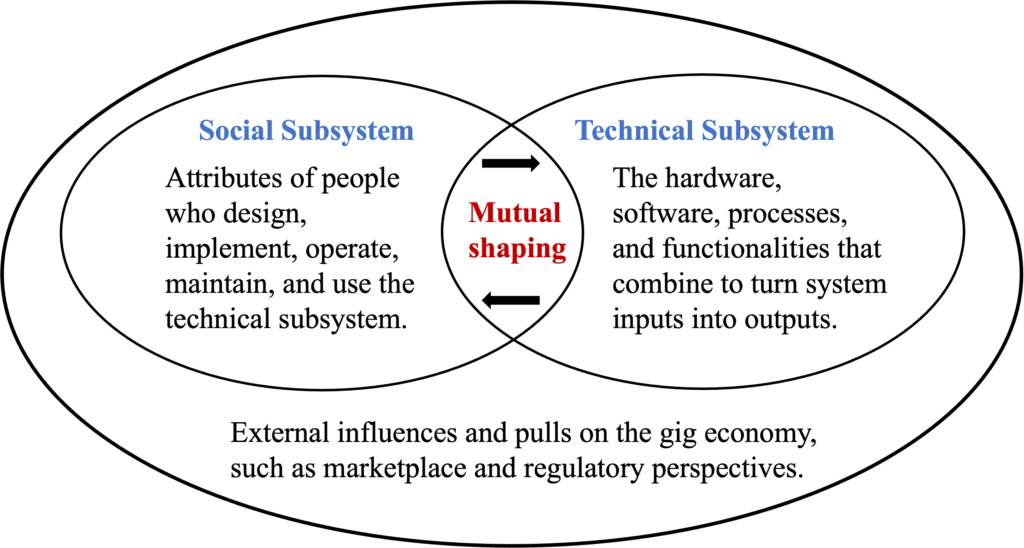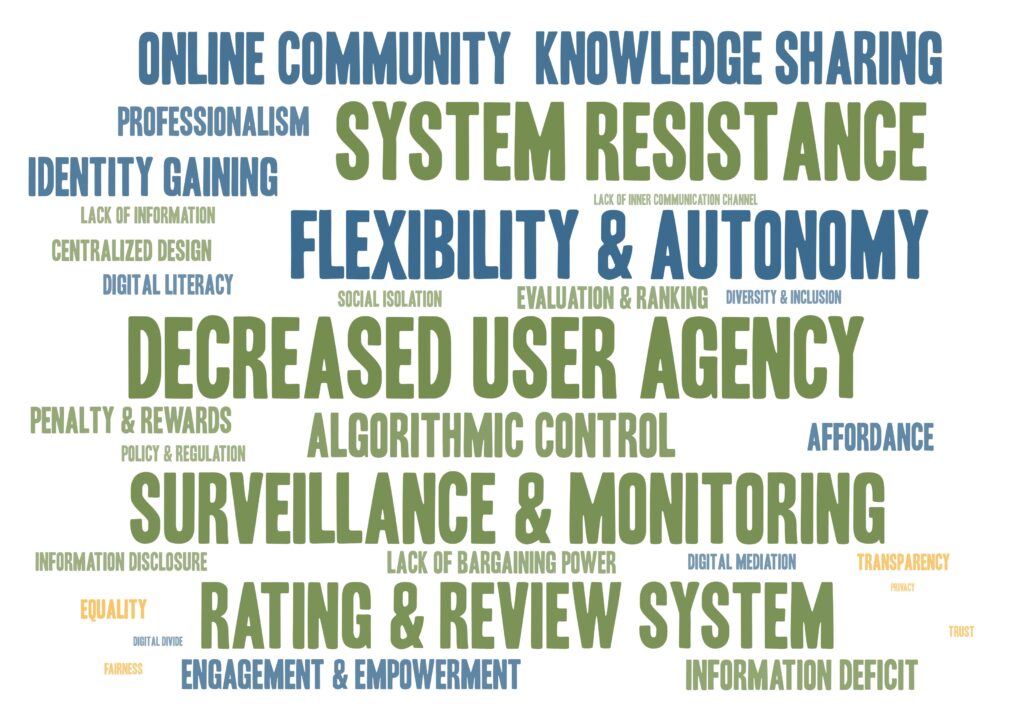Working with Algorithms? The Socio-Technical Issues of the Platform-Mediated Gig Economy
Working with Algorithms? The Socio-Technical Issues of the Platform-Mediated Gig Economy
Meredith Dedema, Ph.D. candidate, Indiana University Bloomington
Howard Rosenbaum, Professor of Information Science, Indiana University Bloomington
Have you worked with algorithms before? How do you feel about having a machine as your boss? In the last decade, an important sector of the work world has undergone a major change, thanks to the platform-mediated gig economy. Imagine moving away from the usual 9-to-5 routine in a physical space and stepping into a digital world of short-term gigs and freelancing. Think of popular names like Uber, TaskRabbit, and Instacart – they’re not just companies they are the catalysts for a whole new way of working and making a living. From driving folks around to completing tasks on-demand, gig opportunities are popping up everywhere every day. Slogans like “Be Your Own Boss” and “Work on Your Terms” have become catchy and easy to read aloud. But is that the reality for people who work with those platforms? This article dives into the socio-technical issues in the platform-mediated gig economy and explores the social aspects of working with algorithms. Get ready for a ride through the gig revolution!
—Gig opportunities are popping up everywhere with slogans like “Be Your Own Boss” and “Work on Your Terms.” But is that the reality for people who work?—

To start, why do we focus on the socio-technical issues in the gig economy? According to socio-technical theory and the social informatics approach, there are complex interactions and relationships between the social subsystem (i.e., gig workers) and the technical subsystem (i.e., platforms). Moreover, two subsystems are in a relationship of mutual shaping.

On one hand, the platform-mediated gig economy provides a means of employment and a source of income for many people who might be otherwise unable to participate the job market, as it levels the playing field, removing many barriers for disadvantaged groups (such as young people, seniors, women, and disabled workers), as well as for workers from depressed regions and less developed countries. On the other hand, there are power asymmetries in the gig economy because platform companies engage in sophisticated algorithmic management where they control access to labor and clients and collect and make use of vast amounts of information . They keep a proportion of job-earnings, regulate who can use their platforms, and control communications between service providers and service consumers. It is important to shed light on the social aspects of working with algorithms and elucidate the intended and unintended consequences of this new form of management.

By conducting a systematic literature review (https://doi.org/10.1002/asi.24868) that focused on gig economy, gig work, and gig workers, we found that the gig economy research is very international and multidisciplinary. Most of the research was conducted in the US and in Asian countries. Scholars from information science, information systems, computer science, to labor studies and sociology all have been contributing to knowledge about gig economy. Besides the traditional gig workers like rideshare drivers and delivery workers, more and more research has turned to other kinds of occupations producing distinctive findings about new types of gig workers, such as beauty workers, online English teacher, and legal consultants.
By manually coding 132 selected papers, we extracted three main themes, eight codes, and 30 subcodes as representative socio-technical issues in the platform-mediated gig economy. The definitions and examples for each theme, code, and subcode with more details can be found in the finding section in the paper.
| Theme | Code | Subcode |
| A Digital Workplace | A1 Information infrastructure | A11 digital divide |
| A12 digital mediation | ||
| A13 digital literacy | ||
| A2 Digital labor | A21 identity gaining | |
| A22 online community | ||
| A23 knowledge sharing | ||
| A24 diversity & inclusion | ||
| A3 User agency | A31 flexibility & autonomy | |
| A32 engagement & empowerment | ||
| A33 affordance | ||
| A34 professionalism | ||
| B Algorithmic Management | B1 Platform governance | B11 centralized design |
| B12 surveillance & monitoring | ||
| B13 algorithmic control | ||
| B14 policy & regulation | ||
| B2 Performance management | B21 rating & review system | |
| B22 evaluation & ranking | ||
| B23 penalty & rewards | ||
| B3 Information asymmetry | B31 lack of information | |
| B32 information deficit | ||
| B33 information disclosure | ||
| B34 lack of communication channel | ||
| B4 Power asymmetry | B41 decreased user agency | |
| B42 social isolation | ||
| B43 lack of bargaining power | ||
| B5 System resistance | ||
| C Ethical Design | C11 trust | |
| C12 fairness | ||
| C13 equality | ||
| C14 privacy | ||
| C15 transparency | ||
As we counted the frequency for each subcode, the results show that different socio-technical issues have different amount of presence in the current literature. Some socio-technical issues are studied and discussed more (e.g., flexibility & autonomy, surveillance & monitoring, and algorithmic control) comparing to other ones (e.g., trust, fairness, and equality).

We also found that gig workers develop online communities where they share their knowledge about gig work, platform governance, and algorithmic control. In this way, gig workers can cope with the information and power asymmetries inherent in gig work.
We would like to see more work investigating these issues. Looking forward to the future, how AI-powered algorithmic management will transform the future of work? Will AI lead to even more precarious work in the gig economy? Regarding big data analytics, how do we protect gig workers’ right of privacy and guarantee the accountability of algorithms? What kind of policies and regulations are needed to ensure digital justice? Now is the time to discover the social aspects of working with algorithms!
This article is a translation of: Dedema, M., & Rosenbaum, H. (2024). Socio‐technical issues in the platform‐mediated gig economy: A systematic literature review. Journal of the Association for Information Science and Technology. https://doi.org/10.1002/asi.24868
Cite this article in APA as: Dedema, M. & Rosenbaum, H. Working with algorithms? The socio-technical issues of the platform-mediated gig economy. (2024, February 12). Information Matters, Vol. 4, Issue 2. https://informationmatters.org/2024/02/working-with-algorithms-the-socio-technical-issues-of-the-platform-mediated-gig-economy/






